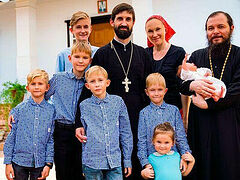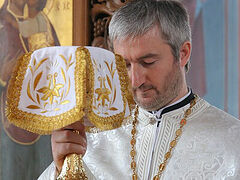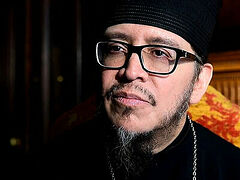To study to become a long-distance navigator, to become a monk in one of the most inclement corners of Russia, then go on a mission to Latin America... No, it is not a script for a movie with a twisted plot, but facts from the biography of Fr. Anthony, a priest from Panama. We talked with Hieromonk Anthony (Zhukov), the rector of the Church of the Protecting Veil of the Most Holy Theotokos in Panama and head of the Deanery of Central America of the Diocese of Argentina and South America of the Moscow Patriarchate, on how a prospective sailor became the helmsman of the ship of faith for the people of Panama, how the sunset in Central America differs from the Russian sunset, why Latin Americans may even be late for a plane, why they like Russian culture, how a successful Orthodox mission can be organized, what malicious plans are being devised against the Russian church on the banks of the Panama Canal, and what helps preserve “spiritual freshness”.
 Hieromonk Anthony (Zhukov) —Father Anthony, how did you come to the faith and why did you decide to become a priest?
Hieromonk Anthony (Zhukov) —Father Anthony, how did you come to the faith and why did you decide to become a priest?
—In 1996 I entered the naval college to learn how to be a long-distance navigator. Actually, I didn’t work in my field. While on a voyage as an intern, I read a Bible for children. At that time, I began to perform my first prayer rule. And when I returned, I also read the Lives of Sts. Sergius of Radonezh and Ephraim the Syrian. And I started attending church. Then I read somewhere that in the past, if a person would miss three Sunday services in a row, he would be excommunicated. It became a real cornerstone for me; I started going to church weekly.
We had only two churches in Kamchatka: a parish church and a cathedral, where services were held daily. When I still practiced on the ship, I was on duty on weekends, so I had to change the parish church to the cathedral. It was there in 2000 that I first met Metropolitan Ignaty (Pologrudov), who then headed the Diocese of Kamchatka. I was just beginning my life in the Church. When Vladyka blessed us, people around would bow their heads, but I would stand erect. Involuntarily, Vladyka’s and my eyes would meet. One day he invited me to his office. We had our first conversation; he gave me some books to read and invited me to pray together after several meetings. I would come to him in the evenings. We performed a prayer rule together. Vladyka lived as an ascetic, which attracted me very much. Then I began to confess my sins to him and take his advice.
When I first met Vladyka, he was the only monk on the peninsula. I began to regard him as my spiritual father, and since then he has guided me up the spiritual ladder and on the monastic path all my life. After graduating from the naval college, I taught special courses in navigation and astronomy at the college for two years. Having fulfilled my duty to the Motherland, I was tonsured by Vladyka and two years later I was ordained hieromonk. I am very grateful to Metropolitan Ignaty, because although there were not enough priests in Kamchatka, he did not immediately ordain me and several other young men who were seeking monastic life. Vladyka gave us the opportunity to mature in a monastic atmosphere and culture for a year and a half or two. Hieromonks have a slightly different ministry: meetings with people, confessions. For two years we lived in a monastic community, where we received excellent monastic training. I remember that time with gratitude to Vladyka.
—But how did it come to pass that you moved from Kamchatka to Latin America?
—Since Vladyka was my father-confessor who tonsured and ordained me, when he was transferred from Kamchatka to the Khabarovsk Diocese, I asked to go with him. There we were involved in building a monastery. After Metropolitan Ignaty had been transferred to Argentina, I asked to join him again and moved, too, in 2016. The first three years of my ministry in Latin America were spent in Argentina. At first I was a driver. Of course, I served, but I was not registered as a clergyman. Vladyka mastered the Spanish language quickly and actively communicated through social media. He had quite a lot of spiritual children there, including from Central America. After about six months of communication with these numerous acquaintances, Vladyka could no longer devote as much time to them as they needed. Then the Metropolitan blessed me to go to Panama—the only parish with a church of the Russian Orthodox Church in Central America at that time. Two priests from the Greek Church joined us in Costa Rica. A reliable person was needed on the spot to help the newly arrived fathers and the Latin Americans who were drawn to the Orthodox faith. Thus, Vladyka sent me as the head of the Deanery of Central America and the rector of the Church of the Protecting Veil of the Most Holy Theotokos in Panama to pastor his spiritual children and all those in the region who were interested in the Orthodox faith. It was in 2019.
—What were your first impressions? Did you have a culture shock? Tell us what (both then and today) caught your eye.
—Let me start with my first impressions of Argentina, although Latin American countries are somewhat similar. We left Khabarovsk in mid-summer and arrived in mid-winter. I was surprised by the weather and nature—the trees were all green in the peak of winter! As for communication with people… I won’t say that I was shocked, but I was surprised, because people in Latin America are a bit irresponsible. They are good at relaxing, but it is very hard to work with them. They can promise something for “tomorrow—tomorrow—tomorrow”, and their magic word is “mañana” (translated as “morning” or “tomorrow”). If a person does not want to fulfill his obligations, he says he will do it tomorrow. They do not know how to refuse, and since I had to solve a lot of issues, I was surprised by such irresponsible Latin Americans: how can they break their promises so easily?
It’s the same story in Panama. Panamanians say they are even worse in this respect. But in fact they are all very similar. Another distinctive characteristic of Latin Americans is problems with punctuality. If we agree to meet at six o’clock, we should expect that they can come by seven or half past seven. Being late for half an hour or an hour is not regarded as being late.
—I wonder how they arrive in time for a plane!
—We once had a pilgrimage group from Argentina. We arranged a tour to the holy places of Russia. So the pilgrims arrived at the airport four hours early! Apparently they played it safe, knowing their habit of being late. In general, such an attitude was annoying and surprising. I must say that if you live in Latin America for seven years, you begin to understand them—the climate is hot, the atmosphere is relaxed, and as a result people prefer a slow pace of life to a fast one. Today a person wants to change all his plans—and he does it easily, ignoring the fact that his friends may be offended. But his friends are not offended—they are like him.
There are also good qualities. Latin Americans are quite open. When you come to Russia on vacation, you notice how self-contained Russians are at first glance. Russians are very open, friendly and cheerful with their friends, but in public places they look concentrated, busy and strained—they have a clear inner program of what needs to be done today. After many years in Latin America this catches your eye. Perhaps there is an advantage in this, because Latin Americans know how to enjoy life and not to be in a hurry... If something happens, they solve problems as they arise.
—Do you like it in Panama? Have you had a desire to return to Kamchatka?
—I have never regretted being here, and there has been no desire to return. Although, when I come on vacation, I realize that I miss Russia, its people and everything that is dear to me here. But when I fly back here, I plunge into my obediences, my life and friends... Those who have learned the language make many friends and new acquaintances here. You are too busy to feel homesick. Besides, we constantly talk about Russian culture here. Our parishioners and my friends are very interested in everything connected with Russia and our culture. Living in Panama, I talk much more about Russian culture than if I lived in Russia. If a priest starts telling parishioners in Russia about Russian culture, they won’t understand him because they know it perfectly well and they can even tell much more things to the priest. But in Panama people listen with open ears and ask questions. They like it! In other words, while living in Panama, I continue to talk about Russia; I do not break away from it, but on the contrary, I immerse myself even more in it.
—Tell us about the atmosphere, the advantages and disadvantages of living in Panama. Give us a more detailed picture of how the country looks through the eyes of a Russian.
—Panama is a very beautiful country. In many ways it is better than other countries in Central or South America. The country is more developed thanks to the Panama Canal. In terms of security, it is very safe here. There are no people who sleep outside on mattresses or cardboard. In Brazil and Argentina this leaves one an unpleasant impression of the country, because you walk down the street and see homeless people in almost every block.
It’s very warm in Panama all year round. It was a great surprise to me that the length of the day and the night is the same here. At six a.m. it is always dawn, and at six p.m. it is always sunset. The day is divided in half. It’s hard to get used to this and believe that it’s possible. In Kamchatka or in central Russia you can admire the sunset for hours. In Panama the sun sets very quickly—it gets dark in fifteen minutes.
The disadvantages…
—There are none? Heaven on earth!
—I can hardly think of any obvious disadvantages except that of the mentality, about which I have already talked. When you start working with Panamanians, your nervous system must be very stable. The latest example: We bought building materials. We have workers who get paid every day. On the first day the materials were not delivered, on the second day they were not delivered either… During construction work it is a very inconvenient moment when you count on one thing, but it turns out otherwise. But a lot of our compatriots come to Panama to start their business here. Coming to Panama to work for Panamanians is absolutely unprofitable. If someone has start-up capital, they come, open their business and succeed. There are many opportunities here. However, there is even more bureaucracy compared to Russia.
—Tell us about the history of Orthodoxy in Panama.
—The Russian Church appeared here in 1998. This year we are marking the twenty-fifth anniversary since the opening of the parish. Before us, the Greek Church had been active here. When our compatriots who led a spiritual life came here in the 1960s, they attended the Greek church. There are good memories of that time.
—How many Orthodox parishes are there in Panama today?
—Only two: the Greeks, and us. There are no other jurisdictions. The Antiochian Church is present in neighboring Guatemala. In Costa Rica our compatriots built a church, and ROCOR pastored them. As for Panama, after the visit of His Holiness Kirill (then he was Metropolitan of Smolensk and Kaliningrad and the Chairman of the DECR) in 1998, agreements were reached on the allocation of land for the construction of a church. In the end they did not give us any land, but they allocated and sold two plots—one with a house for a priest, and the other for the church. Our compatriots then united, met His Holiness and received his blessing to open a parish. After that, first a temporary priest arrived, and then a permanent one.
—Is the community large today? Does it consist of Russians, or are there representatives of other nationalities, including locals?
—On Sundays we have twenty-five to thirty people; only five or six of them are our compatriots—the others are Panamanian families. One of the characteristics of Latin America is that it is customary to go to church with the whole family. This custom is instilled from childhood. The whole family attends the same church, even though one of the spouses is Catholic and the other is Orthodox.
Our compatriots attend less often now because they have grown old. When they attended twenty-five years ago, the ladies were about sixty years old. There were some young people, but they have since left... Now our first parishioners are in their late seventies. They come occasionally and they remember those times with great fondness. But due to their age and problems with mobility they come once or twice a month.
Another distinctive feature: our church is situated in the Panama Canal zone: this is a former American territory, where public transport services are very poor. Many people travel by car or taxi, which is expensive to do every week. We tried to organize a minibus from the center, but it didn’t work out, because not everyone arrives at the beginning of the service. It is difficult to gather people at the same time in one place. Our compatriots are now a minority.
Panamanian families stay for the joint meal after services and communicate actively. They arrive early in the morning, stand through the service, take Communion, then sit at the common meal. When the meal is over, we clear the table… And they sit down and continue to talk for another two hours. This is not a discussion of very important issues, but a continuation of the enjoyment of communication. They know how to communicate and love it. On Sundays Panamanians are in no hurry. The community is their home, where they feel absolutely at ease.
—Can you recall the most striking case of the conversion of locals to Orthodoxy?
—Conversions are not as frequent as in Russia with weekly Baptisms of several people. We have five to six Baptisms a year, and here are few examples.
The latest example: A young man aged about sixteen came from Canada with his family. Sometimes people don’t know whether or not to convert from Catholicism to Orthodoxy—they are interested. This young man (his name is Adam) read everything that he could find in English about the Orthodox faith. He turned to me; he had a great desire. When we talked, Adam showed extensive knowledge of this subject and prepared himself for Baptism. This earned my respect. His parents are not Orthodox.
Many convert to Orthodoxy because they find some Orthodox roots in their lineage. For example, a person has lived in Panama all his life, and when we begin to talk it turns out that his father or grandfather was a Jew who lived in Ukraine and subsequently moved to one country, then to another... In general, such people have roots that have a connection with the Orthodox faith. We noticed this in Argentina; usually people who have at least some distant Slavic roots convert to Orthodoxy.
But there are exceptions. At our parish a twenty-three-year-old lady converted to Orthodoxy, because there is a Greek Church opposite her house. Looking at it every day from the window, she began to go there. And since services and communication are in Greek (the Greek diaspora is quite large, the priest does not know Spanish, and there is enough communication with compatriots), the Panamanians come to us after the Greek church (which is conveniently situated in the city center).
To be continued…








